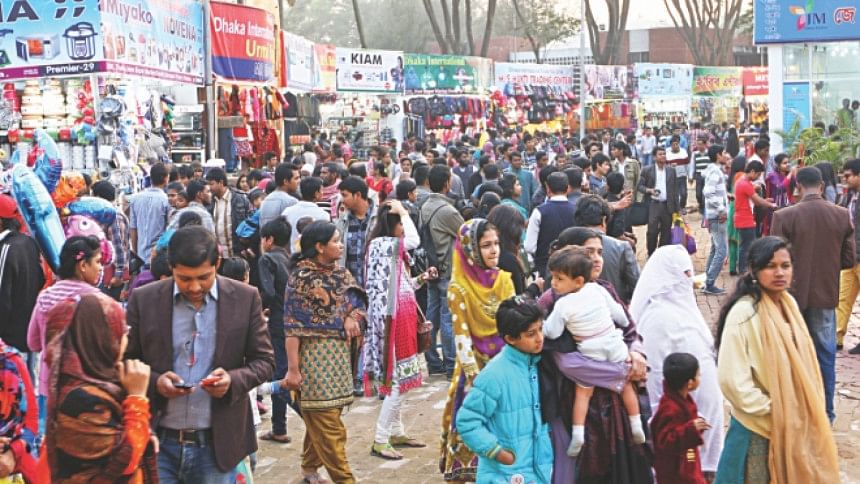Not fair at the fair

The meaning of the word bannijjo is nowhere more profound than at the annual fair that has returned habitually to the Sher-e-Bangla Nagar from early January. To the unsuspecting, the tag might be obvious because the very purpose of the Dhaka International Trade Fair (DITF) is wholly commercial.
While business dealings had crossed the limits of even highway robbery ever since restaurants were allowed on the grounds of the commercial carnival, it seems only this year when the social media has provided the irate victims a platform to vent their grievances, only just.
Unseasoned dulabhais (fresh ones are in a trance and therefore more gullible), and even boyfriends (seasoned though they may be) are the usual targets of the rampant thievery that capitalise on the insouciant palate of the gleeful, and therefore, unmindful visitors.
As you walk past cardboard shacks, adorned with glistening drapery, tired balloons and loud paintwork, you are lured into the ambience of a food riot by the wafting aroma of chicken tikka, katchi biriyani and chotpati floating up your nostrils, encouraged as well by some vociferous campaigning at the threshold, marked by signboards of some of the more popular eateries in the city. At least one such chain restaurant has denied having a stall at the exhibition after its name starred on Facebook for the wrong reasons.
By then, however, hundreds of unsuspecting citizens, maybe more, women and absolutely innocent children, have been fleeced over the month at shanty restaurants that charged a mountain for a molehill, that belittled their judgement, and ridiculed their decency.
There is no reason whatsoever for any such temporary restaurant, whatsoever amount it may have paid to register with the fete organisers or to set up shop with makeshift materials, to demand Tk 300 or so of a customer for a paratha or likewise for a nan ruti, or Tk 1200 for a stick of kabab, even if they were served on gold platters by bejewelled waiters. But they did, and they got away, well except for at least one known reported case.
The male client was flabbergasted to see a bill that was four times the rate prevalent in the city but kept a poker face, mainly because he was entertaining his good friend and his missus. He overcame his initial astonishment, after all a lady was his guest, but was soon overtaken by anger. Spurred on by a resolve not to take it lying down, the gentleman protested the wrongdoing with the manager. After some verbal give and take, the restaurant swallowed its guilt, and first reduced the bill by 25 percent, but after some more serious objections from the customer, it offered to reduce it by more than half. One somewhat happy customer, but not on account of the food that was charged.
The experience can be most distressing for parents who saved some money to take their children to this long-awaited trip, maybe their one-time yearly excursion. So, when the tiny tots smell food and see colourful drinks on the shelves, all they can do is look up to their parents, who to them is the entire world. And, these low- and middle-income parents (the vast bulk of the patrons of the mela) cannot afford a Tk 15 drink or a Tk 50 burger because they are being touted at five or more times the market price. If perchance they order without checking the price, which is not an uncommon practice with such common food items, they can be caught unawares and consequently be in difficulty.
The government-organised fair should not be an unfair opportunity for unscrupulous traders to hijack citizens, who are the toasted guests of the state. Please look up some of the speeches made over the event and you will find words to that effect.
One wonders (with or without munching a mutton chop) whether the Export Promotion Bureau (the mela organisers) have any mouth or hand in such exorbitant prices that is torture, extortion and corruption, all packed in one unpalatable roll. It cannot be that the Bureau officials are not aware of such malpractices; they are sitting on the same fairground. They too must have felt the pangs of hunger during their busy schedule over the month. Have they not noticed that a bottle of water sells at around Tk 100? What is being exported, other than ill vibes and injustice, via these food stalls engaged in unlawful business?
The DITF or Banijjo Mela, as it is commonly known, will be held again from Pahela January next year. A meeting involving relevant wings of Commerce (the host ministry) and Home Affairs (for law and order), and Dudok (Anti-Corruption Commission Bangladesh - ACC) should be held now, so that management is in place for the next and following seasons to thwart 'organisations or individuals (which) profit improperly'.
"Corruption involves the dishonest or preferential use of power or position which has the result of one person or organisation being advantaged over another"; taken from the ACC website, this statement should also be valid for the relationship between the public and the restaurant/food stall owners because the latter are indeed in a position of power by being granted the right to own an establishment, albeit by paying some form of subscription.
Let's plan lunch or dinner at the DITF come next January with a price that is legitimate.
The writer is a practising Architect at BashaBari Ltd., a Commonwealth Scholar and a Fellow, a Baden-Powell Fellow Scout Leader, and a Major Donor Rotarian.

 For all latest news, follow The Daily Star's Google News channel.
For all latest news, follow The Daily Star's Google News channel. 



Comments